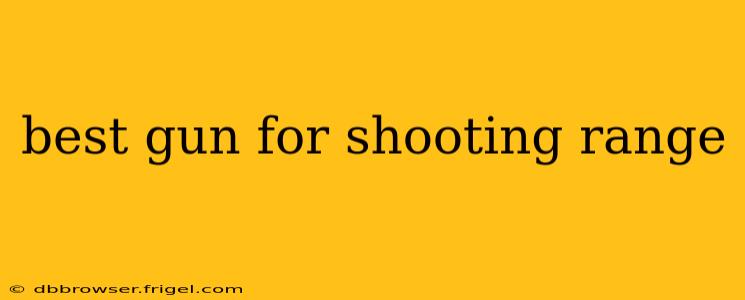Choosing the right firearm for the shooting range can feel overwhelming, with so many options available. This guide will help you navigate the choices, considering your experience level, budget, and shooting goals. We'll cover various popular choices and address common questions to help you make an informed decision. Remember, always prioritize safety and follow all range rules and regulations.
What Type of Shooting Are You Doing?
Before diving into specific firearm recommendations, it's crucial to consider what you plan to do at the range. Different disciplines require different tools.
- Pistol Shooting: This involves handguns, ranging from compact pistols for concealed carry practice to larger competition-style pistols.
- Rifle Shooting: This encompasses various rifle types, from .22LR plinkers ideal for beginners to powerful hunting rifles or precision rifles for long-range shooting.
- Shotgun Shooting: Shotguns are versatile, used for clay pigeon shooting (trap, skeet), sporting clays, or even home defense.
Your chosen discipline significantly impacts the "best" gun for you.
What's Your Experience Level?
Your experience heavily influences your choice.
- Beginners: Start with a .22LR pistol or rifle. These calibers are inexpensive to shoot, have manageable recoil, and are perfect for developing fundamental shooting skills. A single-action revolver can also be a good choice for learning trigger control.
- Intermediate Shooters: As you gain experience, you can explore larger calibers like 9mm (pistols) or .223/5.56 (rifles). Consider exploring different action types (semi-automatic vs. revolver) to expand your skill set.
- Advanced Shooters: Advanced shooters often specialize in specific disciplines and may opt for customized firearms or high-end models optimized for accuracy and performance.
What's Your Budget?
Firearms and ammunition costs can vary widely. Setting a realistic budget is essential.
- Entry-Level: You can find reliable firearms for under $500, especially in .22LR. However, this often means sacrificing some features and potentially compromising on build quality.
- Mid-Range: Between $500 and $1500, you'll find a wider selection of high-quality firearms with improved features and reliability.
- High-End: High-end firearms can cost thousands of dollars, often featuring premium materials, advanced features, and superior accuracy.
H2: What are the best guns for beginners at the shooting range?
For beginners, a .22LR firearm is generally recommended. The low recoil makes it easy to learn proper shooting techniques without the jarring impact of larger calibers. Both rifles and pistols in .22LR are widely available and relatively inexpensive to shoot. Look for models known for their reliability and ease of use.
H2: What are the most popular guns at the shooting range?
Popularity can vary by region and range, but some consistently popular choices include:
- Pistols: Glock 17/19 (9mm), SIG Sauer P320, Smith & Wesson M&P. These are reliable, relatively easy to maintain, and widely available.
- Rifles: AR-15 platform rifles (.223/5.56) and Ruger 10/22 (.22LR). The AR-15 is popular for its modularity and versatility, while the 10/22 is a classic choice for beginners.
- Shotguns: Remington 870 and Mossberg 500 pump-action shotguns are popular for their reliability and affordability.
H2: What are some good guns for target practice?
For target practice, accuracy is key. Look for firearms known for their precision and consistency. This often means selecting a firearm with a good trigger, well-regulated sights, and a barrel designed for accuracy. Consider models specifically designed for competition shooting, as these are often optimized for this purpose.
H2: What should I consider when buying my first gun for the shooting range?
Choosing your first firearm requires careful consideration. Prioritize safety, ease of use, and reliability. Consider the following:
- Caliber: Start with a lower-caliber firearm like .22LR.
- Action type: Single-action revolvers can be easier to learn on than semi-automatic pistols.
- Ergonomics: Ensure the firearm fits comfortably in your hand.
- Maintenance: Choose a firearm that is relatively easy to clean and maintain.
- Reputation: Research the manufacturer and model to ensure a good reputation for reliability.
Disclaimer: This information is for educational purposes only. Always consult with a qualified firearms instructor and follow all applicable laws and regulations before purchasing or handling firearms. Safe gun handling practices are paramount.
